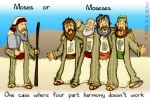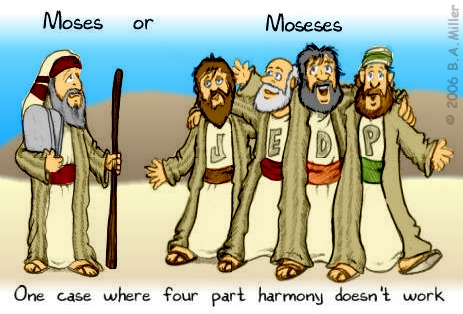
Warning: This post will interest only the most scholarly among you… It is written in answer to a question sent in by a reader about Genesis 1-2. Here is the question:
Question: Genesis 1 and Genesis 2 appear to be written by different people. How is your understanding on this?
Here is my roundabout way of answering:
Yes, Genesis 1 and Genesis 2 do appear to be written by different people. Bible scholars have noted that different names of God are used in these two chapters, along with different terminology, different themes, and even a somewhat different order of events. These differences aren’t just with Genesis 1 and Genesis 2, of course, but with the entire Pentateuch.
The JEDP Hypothesis
This has led some scholars to suggest that there were maybe 4 authors (or groups of authors) for the Pentateuch, and they can be identified by their emphasis and by what name(s) for God they seemed to have preferred. This theory is called the Documentary theory or the JEDP hypothesis, and the four authors (or groups of authors) are identified as the Yahwist (J), the Elohist (E), the Deuteronomist (D), and the Priestly (P). According to this theory, it is believed that the Priestly author wrote Genesis 1:1-2:3 and the Yahwist wrote Genesis 2:4ff.
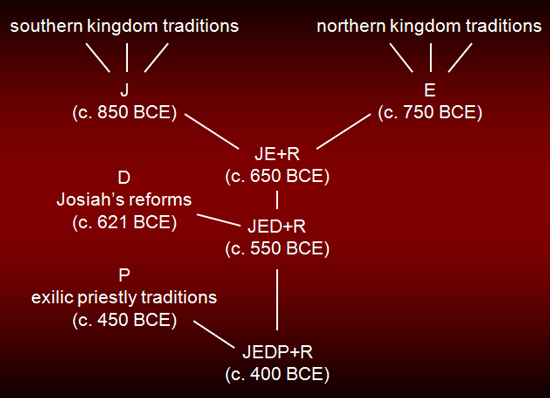
Q Theory
So what do I think of this theory? Well, I take an approach similar to how I approach a similar theory about the 4 Gospels in the New Testament. Conventional scholarly wisdom about the 4 Gospels says that there is a “Q” source document for the Gospels which has been lost. It is believed that Matthew and Luke had this “Q” (along with the Gospel of Mark) and used it to write their Gospel accounts.
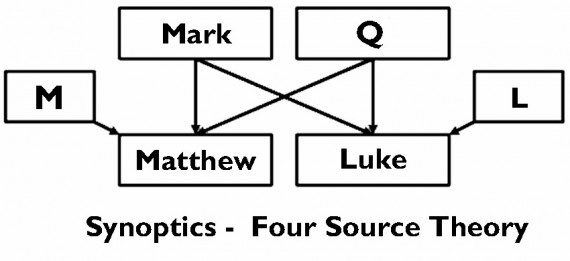
I never bought into this line of reasoning and remember having many long discussions and debates with other students about this when when I was in Bible college and seminary. My view is a minority opinion, of course, but I was thrilled to read a few years back something that N. T. Wright wrote about Q:
I have never completely caught the disease called Q, though from time to time I have experienced that shivery feeling, and the concomitant double vision, that those who have a chronic case of the Q disease reveal as their normal state. I have experienced, though, an interesting phenomenon: my inability to make up my mind on the synoptic problem has not, I think, in any way impaired my ability to read Matthew, Mark, and Luke as Matthew, Mark, and Luke, nor indeed my ability — though some would no doubt question this — to think and write about this historical Jesus.
How People Write
So anyway, my view of the JEDP hypothesis is similar. I honestly believe Moses wrote most of the Pentateuch (probably all of it except the last chapter of Deuteronomy). Did he have sources? Probably. He likely had some documents or oral traditions from which he drew, and which might account for the differences in the various texts.
Here’s my main concern: Why do modern biblical scholars do not give the same freedom and flexibility to biblical authors that we allows ourselves? Look, I have been writing for about 20 years. If I go back and look at the themes I wrote about 20 years ago, the words I used, the way I thought about God, the names I used for God, and a whole host of other ideas, the “me” of 20 years ago writes nothing like the “me” of today.
Even if I wrote something today and then sat down tomorrow to write it again without looking, I am certain I would phrase things different, write with a different emphasis, and refer to God in different ways. This is true of all authors around the world and throughout time. Cannot this also be true of biblical authors? Of course it can!
I sometimes think these documentary theories are nothing more than scholarly inventions to give scholars something to write about who have become bored with the biblical text itself.
Genesis 1-2
So to answer the original question. Were Genesis 1 and Genesis 2 written by different authors? No, I do not believe so. I believe Moses wrote both, though I believe that he may have used different sources or oral traditions to record the two accounts, but even then, both are accurate and simply reflect two different thematic perspectives on the creation account.
So do I believe in the JEDP hypothesis? Not really. Just like I don’t hold to the Q theory either.
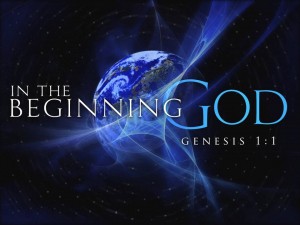 (As long as I am off in the weeds writing about scholarly conventional wisdom which I do not accept, I might as well include here that I also do not accept most of the canons of textual criticism which give priority to the Critical Text based on a few early documents rather than the Majority Text based on thousands of later documents…)
(As long as I am off in the weeds writing about scholarly conventional wisdom which I do not accept, I might as well include here that I also do not accept most of the canons of textual criticism which give priority to the Critical Text based on a few early documents rather than the Majority Text based on thousands of later documents…)
But guess what? Just as N. T. Wright wrote above that a rejection of the Q theory doesn’t keep him from understanding the Gospels, the rejection of the JEDP hypothesis doesn’t keep me from understanding the creation account or the rest of the Pentateuch. In Genesis 1-2 we can still see a beautifully constructed polemic against the Egyptian and Canaanite creation myths that were common in the days of Moses.
Wait… what? Am I saying that Genesis 1-2 do not offer a scientific treatise on how the universe began?
… We’ll have to save that as a question for another time…
The point is this: While the question of authorship is vitally important for understanding Scripture, the question of meaning is even more significant. In other words, the question “What does the text mean?” is way more important than the question “Who wrote this text?” And whether you believe Moses wrote Genesis 1-2 or some nameless Priestly author and Yahwist, you can still find great truth in the message of the text itself.


